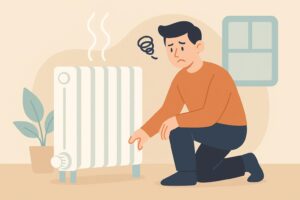Is your boiler making strange noises or failing to provide adequate heating? As experienced boiler repair specialists in Southampton and across Hampshire, we’ve seen it all when it comes to boiler issues. While some problems require professional assistance, others have simple fixes you can try yourself. Here are the 10 most common boiler problems we encounter and what you can do about them.
1. No Hot Water or Heating
This is perhaps the most common complaint we hear from homeowners.
Possible causes:
- Thermostat issues
- Low water pressure
- Broken diaphragm or airlock
- Faulty motorised valve
What you can try: Check your thermostat settings first. Ensure it’s switched on, set to the correct mode, and the temperature is high enough to trigger heating. If your pressure gauge shows below 1 bar, you might need to repressurise your system following your boiler manual’s instructions.
When to call a professional: If checking your thermostat and pressure doesn’t resolve the issue, it’s time to call in a Gas Safe registered engineer.
2. Boiler Leaking or Dripping
Water leaking from your boiler should never be ignored as it can cause damage to your home and the boiler itself.
Possible causes:
- Broken internal components (pump, pressure valve, seal)
- Corrosion within the system
- Poorly installed pipework
What you can try: Unfortunately, there’s little you can do yourself for leaks except to place a container to catch drips temporarily and switch off the water supply to the boiler if possible.
When to call a professional: Any leak requires professional attention as soon as possible.
3. Boiler Making Strange Noises
Banging, whistling, or gurgling noises (sometimes called ‘kettling’) can be alarming.
Possible causes:
- Limescale build-up on the heat exchanger
- Air in the system
- Low water pressure
- Pump issues
What you can try: Check and adjust the pressure if it’s low. For gurgling sounds, bleeding your radiators might help remove trapped air.
When to call a professional: If noises persist after checking pressure and bleeding radiators, professional descaling or component replacement may be needed.
4. Pilot Light Keeps Going Out
On older boilers with a permanent pilot light, this can be frustrating.
Possible causes:
- Draught blowing out the flame
- Faulty thermocouple
- Deposit build-up
What you can try: Carefully relight the pilot light following your boiler manual’s instructions.
When to call a professional: If the pilot light repeatedly goes out, there may be a safety issue that requires expert attention.
5. Boiler Keeps Losing Pressure
A boiler that frequently loses pressure indicates a problem in the system.
Possible causes:
- Water leaks in the system
- Issues with the pressure relief valve
- Bleeding radiators recently
What you can try: Repressurise the system according to the manufacturer’s instructions, but if it drops again quickly, there’s likely a leak.
When to call a professional: Recurring pressure loss indicates a leak that needs professional detection and repair.
6. Radiators Not Heating Up Properly
Cold spots on radiators are typically caused by trapped air or sludge build-up.
Possible causes:
- Air trapped in the system
- Sludge build-up
- Imbalanced system
- Faulty radiator valves
What you can try: Bleed your radiators to remove trapped air. If radiators are cold at the bottom, this often indicates sludge build-up.
When to call a professional: If bleeding doesn’t solve the problem, a power flush of your system might be needed.
7. Thermostat Issues
An inaccurate or faulty thermostat can cause heating problems.
Possible causes:
- Incorrect settings
- Battery issues
- Faulty wiring
- Thermostat placement issues
What you can try: Replace batteries and check settings. Ensure your thermostat isn’t placed near draughts or heat sources.
When to call a professional: If your thermostat seems completely unresponsive or gives erratic readings, it may need replacement.
8. Frozen Condensate Pipe
Common in winter, this causes your boiler to shut down.
Possible causes:
- Very cold weather freezing the condensate pipe that carries acidic water away from the boiler
What you can try: Carefully pour warm (not boiling) water over the external pipe to thaw it. Once thawed, reset your boiler.
When to call a professional: If you cannot locate or safely access the condensate pipe, or if thawing doesn’t resolve the issue.
9. Low Boiler Pressure
Most boilers operate efficiently between 1-1.5 bar pressure.
Possible causes:
- Water leaks
- Recently bled radiators
- Pressure relief valve issues
What you can try: Repressurise your system using the filling loop according to your boiler manual.
When to call a professional: If you’re unsure how to repressurise safely or if pressure problems persist.
10. Complete Boiler Breakdown
Sometimes a boiler simply stops working altogether.
Possible causes:
- Power supply issues
- Serious internal component failure
- End of boiler lifespan (typically 10-15 years)
What you can try: Check fuses, power supply, and gas supply. Try resetting the boiler following the manufacturer’s instructions.
When to call a professional: If basic checks don’t resolve the issue, you’ll need a professional diagnosis.
Need Professional Help?
If you’re experiencing any of these boiler problems and need reliable boiler repairs in Southampton, contact LW Gas today. Our Gas Safe registered engineers provide prompt, professional service throughout Hampshire. Get in touch for assistance with any boiler issues.


